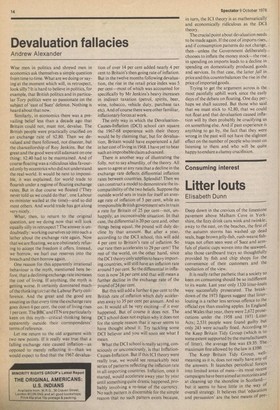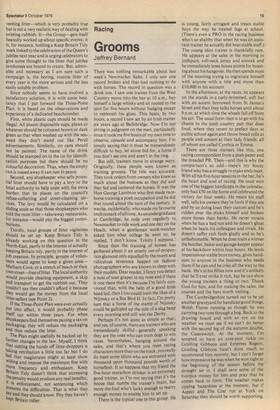Consuming interest
Litter louts
Elisabeth Dunn
Deep down in the crevices of the limestone pavement above Malham Cove in Yorkshire, the fizzy drink cans wink and twinkle; away to the east, on the beaches, the first of the autumn storms has washed up dead seals, huge brown jelly-fish, rush-weave fishtraps not often seen west of Suez and armfuls of plastic cups woven into the seaweed, also those cardboard trays so thoughtfully provided by fish and chip shops for the convenience of their customers and the spoliation of the view.
It is really rather pathetic that a society so keen on consuming should be so indifferent to its waste. Last year only 1320 litter-louts were successfully prosecuted. The breakdown of the 1973 figures suggest that litterlouting is a rather less serious offence to the official eye than stealing apples. In England and Wales that year, there were 2,672 prosecutions under the 1958 and 1971 Litter Acts; 2,531 people were found guilty but only 243 were actually fined. According to the Keep Britain Tidy Group (which is to some extent supported by the manufacturers of litter), the average fine was £9.35. The maximum fine allowed by the law is £100.
The Keep Britain Tidy Group, wellmeaning as it is, does not really have any of the answers. It launches periodical forays into limited areas of mess—its most recent campaigns have been aimed at motorists and at cleaning up the shoreline in Scotland-but it seems to have little in the way, of overall strategy. It believes that 'education and persuasion' are the best means of pre
venting litter—which is very probably true but is not a very realistic way of dealing with existing rubbish. It—the Group—gets itself heatedly worked up about specific events; it is, for instance, holding a Keep Britain Tidy week linked to the celebration of the Queen's jubilee next year and is urging celebrators to give some thought to the litter that jubilee jamborees are bound to create. But, admirable and necessary as I am sure such a campaign is, the boring, routine litter of every year is the more serious and the less easily soluble problem.
Since nobody seems to have evolved a satisfactory solution, it is with some hesitancy that I put forward the Three-Point Plan. It is based on the observations and experience of a dedicated beachcomber.
First, white plastic cups should be made illegal. All plastic disposable cups, plates or whatever should be coloured brown or dark green so that when washed up with the seaweed they don't stand out like Persil advertisements. Similarly, tin cans should not be painted. The name of the drink Should be stamped on to the tin for identification purposes but there should be no colourful decoration. Thus, when the empty can is tossed away it can rust in peace.
Second, any shopkeeper who sells potential litter should have to pay a levy to the local authority to help cope with the extra burden that he places on the council's refuse-collecting and street-cleaning services. The levy would be calculated on a sliding scale so that those shopkeepers who sold the most litter—take-away restaurants, for instance—would pay the biggest contributions.
Thirdly, local groups of litter vigilantes Should be set up. Keep Britain Tidy is already working on this question in the North-East, partly in the interest of actually keeping Britain tidy, partly in the interest of Job creation. In principle, groups of volunteers would agree to keep a given areaMalham Cove, or a stretch of beach or their Own street—free oflitter. The local authority Would provide cleaning equipment, a skip and transport to get the rubbish out. They Couldn't say they couldn't afford it because they would get the money from the local litter-sellers (see Point 2).
If the Three-Point Plan were ever actually pUt into effect, it would probably phase itself out within three years. For when Shopkeepers find themselves paying a tax on Packaging, they will reduce the packaging and thus reduce the litter.
The Plan might usefully be backed up by further changes in the law. Myself, I think that cutting the hands off litter-droppers is taking retribution a little too far but I do feel that magistrates might at least show Willing and impose the maximum fine with More frequency and enthusiasm. Keep Britain Tidy doesn't think that increasing he Penalty would produce any real benefits; it is enforcement, not sentencing which Presents the difficulties. That is what they say and they should know. Pity they haven't kept Britain tidier.



































 Previous page
Previous page